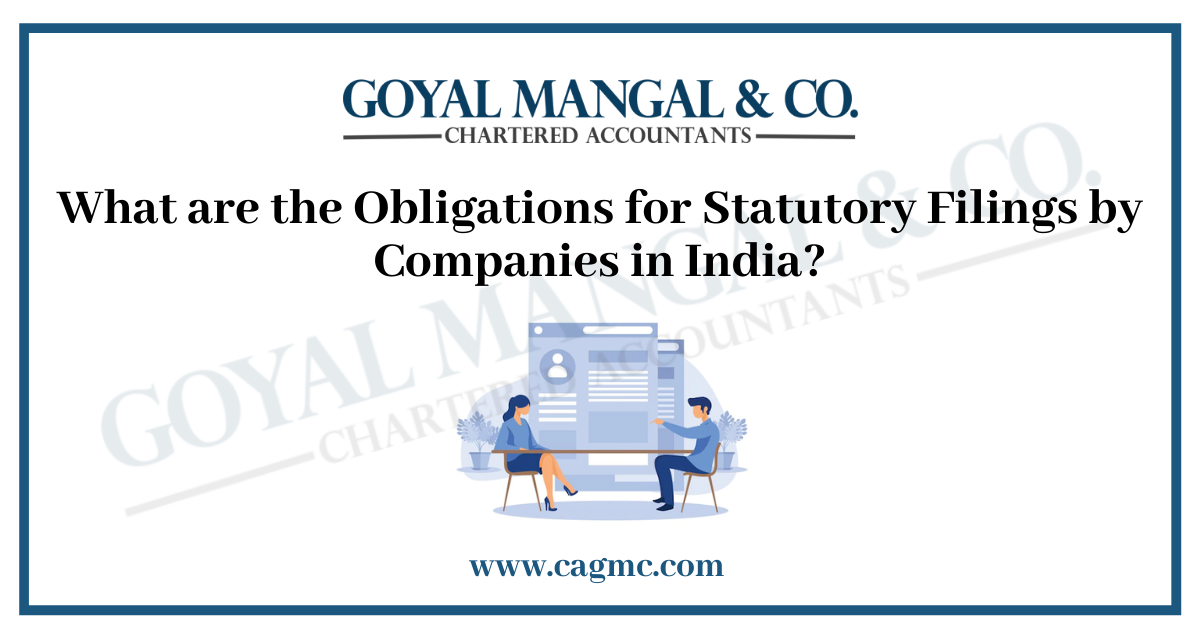
Are you planning to start your own company? There are things that you need to file regularly to the government. What are these mandatory filings? How do you ensure that your business is run according to the guidelines of the government? How can you protect your business from audits? In this article, we will discuss Obligations for Statutory Filings by Companies in India.
| Table of Content |
What are Statutory Filings?
Statutory reporting is the mandatory submission of financial and non-financial information to a government agency. Each industry has its own set of laws and regulations (statues) that mandate reports. Essentially, you have to submit your information to the government so that they can keep a track of your activities.
Forms for Statutory Filings
The Statutory Obligations of a company is governed by the Compliance Act, 2013. The following are the filings that you need to file to comply with the Government regulations,
- Annual filing of Return of Deposits with the MCA (DPT‐3) – Section 73 and Rule 16
All companies are required to file for the period ending of 31st March to 30th June for the actual deposits and the considered not deposits.
- Filing of disclosure of Substantial Beneficial Ownership with the MCA (SBO)-(BEN‐2) – Section 90
All Companies need to file BEN‐2 within 30 days from the date of receipt of BEN‐1 by the companies from the Shareholders. Further, all Companies also need to file BEN‐2 within 30 days from the date of receipt of BEN‐1 by the companies from the Shareholders for any further change in SBO. - Annual Filing for a Certification by a Practicing CS against Company’s Annual Return with the MCA (MGT‐8) – Section 92(2)
This form is to be filed by, all listed public limited companies need to file. Moreover, all non-listed public limited and private limited companies also need to file. Further, the Paid-up share capital is a minimum of Rs.10 crore. Otherwise, Turnover is minimum Rs.50 crore.
- Annual and instant filing of Resolution with the MCA (MGT‐14) – Section 117 read with 179
All Public Limited companies need to file annually within 30 days from the date of approval of the Directors Report and the Financial Statements etc. by the shareholders in AGM. All Companie also need to file where a resolution is needed to be passed under the Section 117 read with 179(3)
- Annual filing of Report on the AGM with the MCA (MGT‐15) – Section 121
All listed public limited companies need to file a report on the AGM within 30 days from the date of AGM.
- Annual Filing along with financial statements with the MCA (AOC‐4) – Section 137
All Companies need to file along with their Financial Statements, Director’s Report, Statutory Auditors’ Report and Notice of AGM within 30 days from the date of AGM
- Annual Filing for the Appointment of an Internal Auditor with the MCA (MGT‐14) – Section 138
All listed public limited companies need to file for the appointment of an Internal Auditor within 30 days from the date of appointment. Further, all Public Limited Companies need to file for the appointment of an Internal Auditor within 30 days from the date of appointment.
- One time filing for the Appointment of Statutory Auditors for five years with the MCA (ADT‐1) – Section 139
All Companies need to file for a maximum period of 5 years from the date of the first AGM to the fifth AGM. A one-time filing is required within 15 days from the date of AGM where the appointment is approved.
- One time filing for the Appointment of a Director with the MCA (DIR‐12) – Section 149
All Companies need to file for an appointment of a director within maximum of 30 days from the date of the meeting of the board of directors or AGM, where the appointment is approved.
- One time filing of disclosure by a director for his Non-disqualifications with the company (DIR‐8) – Section 164 (2) and 143(3)(g)
All Directors need to submit a disclosure at the beginning of each financial year about their non‐disqualification during the previous financial year for an appointment as a director.
- Annual filing of disclosure by a director for his interest in any other entity with the company (MBP‐1) – Section 184(1)
All directors need to disclose during 1st meeting of the board of directors after their appointment regarding their interest in any other entity and also to disclose at the first meeting of the board of directors during each financial year. All directors also need to disclose their interest in any other entity where there is any change in their interest
- One time filing for the Appointment of a Key Managerial Personnel (KMP) with the MCA (MR‐1) – Section 203
The appointment of a Key Managerial Personnel by, all listed public limited companies need to appoint KMPs. Further, all non-listed Public Limited. The companies need to file form MR-1 within 30 days from the date of appointment or reappointment.
- Half-year filing for the delay in Payments to the MSME Vendors with the MCA (MSME‐1) – Section 405
Companies need to file for the delay in payments to MSME vendors up to 30th October and 30th April for the 30th September and 31st March, i.e. half-yearly.
- Half-yearly filing of reconciliation of the Share Capital with the MCA (PAS‐6) – Rule 9A (8)
Non listed Public Limited companies need to file a reconciliation of Share Capital up to 30th October and 30th April for the 30th September and 31st March half-yearly.
- Annual filing of KYC of Directors with the MCA (DIR‐3 KYC) – Rule‐12A
All directors need to file up to 30th April of each financial year.
Provisions You Need to Comply With
Apart from statutory filing, you also need to comply with certain other provisions. They are,
- Annual Notice of AGM by the companies to the shareholders (In Prescribed format) – Section 101
Notice of AGM is to be sent by all companies to all Director, Shareholders. Further, also to send to the Statutory Auditors, all Debenture Trustees and any recipient as specified.
- Annual Preparation of Director’s Report by the companies to the shareholders (In Prescribed Format) – Section 134
All Companies need to prepare the prescribed information’s as required under the Companies Act, 2013, rules thereon and relevant provisions of the other Acts.
- Annual Preparation of Financial Statements by the companies to all stakeholders (In Prescribed Format) – Section 136
All Companies need to send the financial statements to all stakeholders as duly approved by the board of directors before 21 days from the date of AGM.
- Quarterly holding of meeting by the board of directors of the companies for the directors (In Prescribed Procedure) – Section 173 and Secretarial Standard (SS‐I)
All Companies need to hold the Board Meetings. A minimum of 4 meetings need to be held during a financial year. Further, a maximum gap permitted for holding 2 board of directors meetings is 120 days. Moreover, a minimum of 1 meeting is required during each calendar quarter.
- Annual preparation of Secretarial Audit Report by a Practising CS for the board of directors of the companies (MR-3) – Section 204
A Secretarial Audit is to be conducted by a practising CS for, all Listed public limited companies and all non-listed Public Limited Companies. Further, the paid‐up Share Capital is a minimum of Rs. 50 crore. Otherwise, Turnover is a minimum of Rs. 250 crore.
Facilities Provided
There are certain facilities that are provided to you by the Compliance Act, 2013. These facilities are,
- Facility for E‐Voting by the companies to the shareholders (In Prescribed Procedure) – Section 108
All listed public limited companies need to provide an e‐voting facility for casting votes to the Shareholders in AGM
- Facility for Postal Ballot by the companies to the shareholders (In Prescribed Format) – Section 110
All Companies need to provide Postal Ballot Facility for casting votes to the Shareholders in AGM. Facility for the postal ballot is not required by an OPC or any companies where shareholders are up to 200
- Special Resolutions – the Section 179(3) : Matters for Special Resolutions to be passed are the followings,
To make calls on shareholders in respect of money unpaid on their shares
To authorize buy‐back of securities under section 68
To issue securities, including debentures, whether in or outside India
To borrow monies
To invest the funds of the company
To grant loans or give guarantee or provide security in respect of loans
To approve the financial statement and the Board’s report
To diversify the business of the company
To approve amalgamation, merger or reconstruction
To take over a company or acquire a controlling or substantial stake in another company
Any other matter which may be prescribed
Conclusion
To run your company in India you need to comply with the regulations set by the government. Further, you also need to file your income tax. Moreover, you also need to follow the Labour Laws in the country. In conclusion, you have to complete your Statutory Filings to run your business in India.







